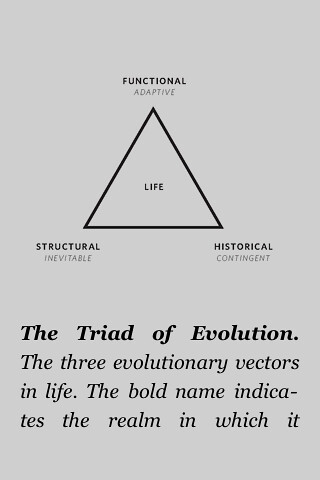Archetypal Tendencies
I’ve been reading Kevin Kelly’s What Technology Wants. One of the central thesis of the book is that evolution is not only driven by adaptation. There are two other forces at work: structural forces, ie the laws of physics and contingency, luck. What if Beethoven did not have a piano?
I’ll post the picture that impressed me again:
This is a central idea (from the book):
The progression of inventions is in many ways the march toward forms dictated by physics and chemistry in a sequence determined by the rules of complexity. We might call this technology’s imperative.
What is stirring me to write this post is that I listened to a podcast today on Tech Nation, Moira Gunn interviewing Adrian Bejan – details
It is uncanny, and totally in line with the Kevin Kelly theory of what is inevitable that these tow come up with the same ideas. This is the time when we make a shift from classical darwinism, to incorporate something marx might have called dialectical materialism.
More about & by Adrian Bejan here:
TEDxBucharest – Adrian Bejan – YouTube
Interview with ‘Design in Nature’ Author Adrian Bejan, Part One …
His book on Amazon:

This theory, Bejan calls it “Constructal Law” governs everything. From his book:
The constructal law is revolutionary because it is a law of physics—and not just of biology, hydrology, geology, geophysics, or engineering. It governs any system, any time, anywhere, encompassing inanimate (rivers and lightning bolts), animate (trees, animals), and engineered (technology) phenomena, as well as the evolving flows of social constructs such as knowledge, language, and culture. All designs arise and evolve according to the same law.
What excites me is that the same law – or rules of complexity, a law about change really, governs the psyche too. I think Jung was onto this with archetypes. These structures are universal across cultures.
Saturday, 02 July 2022
I’m reading his “The Physics of Life — The Evolution of Everything”. Its at odds with what I’m thinking now. It’s not remotly dialectical. It’s all billiard balls. Nevermind. One day I may sort this out. Just annoying right now.
Howard Rheingold – Net Smart
Net Smart
The future of digital culture—yours, mine, and ours—depends on how well we learn to use the media that have infiltrated, amplified, distracted, enriched, and complicated our lives. How you employ a search engine, stream video from your phonecam, or update your Facebook status matters to you and everyone, because the ways people use new media in the first years of an emerging communication regime can influence the way those media end up being used and misused for decades to come. Instead of confining my exploration to whether or not Google is making us stupid, Facebook is commoditizing our privacy, or Twitter is chopping our attention into microslices all good questions, Ive been asking myself and others how to use social media intelligently, humanely, and above all mindfully. This book is about what Ive learned.
via Howard Rheingold | Exploring mind amplifiers since 1964.
Ifttt

via Flickr http://flic.kr/p/bBN38a
If Apple mad a car would it look like this?
If Apple made a car would it have wheels like this?
 From:http://en.wikipedia.org/wiki/Skeuomorph
From:http://en.wikipedia.org/wiki/Skeuomorph
Skeuomorphic thinking may work on occasions but on the whole it is bad. Fake spokes.
Like the fake leather in apple apps. Ugh.
The calendar app does it right on the interface, it tells me it is Wednesday 25! Just right.
Jobs invented the “desktop” metaphor (Or so its said), it is a guide in a place where nothing is real.
Exaptation – copy & paste in the evolution of tech and culture
Just got a name for something I have grasped for a long time. I used to call it accidental by products of evolution, and had this idea when I was doing biology aged 15. EG the piano is a by product of the evolution of fingers. We as humans have gone beyond what was biologically fittest, accidental by-products just heaped upon themselves and interacted with each other to enable creativity and consciousness.
From What Technology wants by Kevin Kelly page 50: “These inadvertent anticipatory inventions are called exaptations in biology.”
“Exaptation is a term used in evolutionary biology to describe a trait that has been co-opted for a use other than the one for which natural selection has built it.”
“It is a relatively new term, proposed by Stephen Jay Gould and Elisabeth Vrba in 1982 to make the point that a trait’s current use does not necessarily explain its historical origin. They proposed exaptation as a counterpart to the concept of adaptation.
For example, the earliest feathers belonged to dinosaurs not capable of flight. So, they must have first evolved for something else. Researchers have speculated early feathers may have been used for attracting mates or keeping warm. But later on, feathers became essential for modern birds’ flight.
It is a relatively new term, proposed by Stephen Jay Gould and Elisabeth Vrba in 1982 to make the point that a trait’s current use does not necessarily explain its historical origin. They proposed exaptation as a counterpart to the concept of adaptation.
For example, the earliest feathers belonged to dinosaurs not capable of flight. So, they must have first evolved for something else. Researchers have speculated early feathers may have been used for attracting mates or keeping warm. But later on, feathers became essential for modern birds’ flight.
(Perry, 2013)
In the evolution of technology and culture it is all exaptation. The reason is that the basis of tech and cultural evolution are not genetic, the information is carried by social means. Thus nothing goes extinct, and all innovations can be resurrected. In other words we can cut and paste to make new things, that process is far faster and more efficient than evolution in the biological sphere. Sexual reproduction is a form of cut & paste, but still far more primitive than what we can do with our inventions.
For example: Id love to graft the Graffiti handwriting system from the dead Palm onto a current smartphone.
References
Parry, Wynne. (2013, September 16). Exaptation: How evolution uses what’s available. Retrieved February 8, 2016, from http://www.livescience.com/39688-exaptation.html
Jesus the man, Jobs the man
To make sense of this post you may need to read my last entry.
Also you may need to know who Barnum was:
And read: http://www.nytimes.com/2011/10/02/theater/mike-daisey-discusses-the-agony-and-ecstasy-of-steve-jobs.html?src=dayp that my friend Amy just sent me.
Jobs may well be a Barnum, and like Barnum he creates a new medium for communication, but it is not just the man. It is as if humanity is ready for a jump and it finds a vehicle to make it happen. Unfortunately it has to make in the capitalist context, given the failure of the German revolution after World War one. While Jobs is a creative guy, no doubt, and while he is enough of a Barnum to pull it all off in the world as it is, the world was ripe for a new leap in communication, to go beyond printing presses and beyond tele type machines. It took someone to make the next leap actual. Zuckerberg is another such. These steps in the evolution of the psyche are all distorted by the fucked up relations of production. The agony is to live in a sick social system, the actual agony of children in chinese factories and the agony of collusion, alienation and powerlessness for many others of us.
The leap in relations of production that we were on the edge of in capitalist countries at the start of the last century did not happen, history missed its natural turning. If we were in an era of new social relations of production the miserable state of psychological developments would not be the context for these technical innovations leading to huge cultural global shifts sweeping the world. However Rosa Luxembourg was assassinated, the social democrats subverted the revolution, industrial revolutions happens in the name of socialism and distorted the history of possible new relations of production. But that is how it is.
So what of new developments? Everything we create or do is in a backward social system. Creativity is social and public, but ownership lags behind, it is private and coercive and seeks out Dickensian situations such as china to maximize profits and to avoid failure in the market. I don’t think Jobs sold out on his vision, I imagine there was agony in making it happen.
Should he not have made the mouse, the first personal pc? Should we not use the technology? It is tempting as every object contains the labour power of the poor and exploited. I don’t think it it’s the answer to smash the tools, unless there was a mass movement of boycott. Even then the much needed jump is nothing to do with the tools, but in the relations of production, and this not because “we” collude with Chinese fascism, as Mike Daisey implies in the NYT interview. It is more that capitalism went global, that it is alive and well as a system. Not so well actually, perhaps in its vicious death trows. Who will lead that transition we are now on the edge of? We are ripe for another leap.
The revolution, innovation, the next big thing will not be technological but social and political. People who lead this next leap forward won’t be just great writers like Marx or orators like Lenin and Trotsky but people able to lead using the new orality of the Internet, even though its built with an unjust system of production. The screens are not the same thing as the humans who communicate via those screens. Revolution won’t be be because of the the Internet, but it can’t happen if people throw away their telephones and everything made in China, we live in this world.
The reflection I’m making, if it is not obvious, is that there are mighty forces at work, and that no one man Jesus or Jobs is really the cause of them. There is always someone who gives expression most fully and effectively to a collective urge. The power of leaders is not only because of what they do or say, but because of the ripeness of the culture they speak to. The culture chooses leaders.
Lift – Achieve anything.
We don’t know much about this app. One thing I know is that the name and subtitle are fantastic. Getting these things right is such an art. The image of a rocket on the site works well with the slogan. If it is a flop it might be that it will be hard to live up to the promise of the name. Think how well titles like GTD and Getting the Love You Want work. Lift is good.
I find it inspiring. Trying to name a couple of personal & professional development groups at the moment. I’d like to have this team look at my ideas.
A quote from helium follows:
How Jobs sold conformity to the hipsters
The paradox in this article is not really such a fresh perspective, its is a story we already know. But it is well told, and the full quote of the 1984 ad is very paradoxical. Apple is ideologically driven, they represent a fundamentalist ideology that holds together and drives the Apple machine. It is a strength, but I bet it will be this very strength that will ultimately be its downfall.
The outgoing Apple CEO’s genius was in embracing the precise corporate values to which the Apple brand was ostensibly opposed, writes Andrew Potter
BY ANDREW POTTER, OTTAWA CITIZEN AUGUST 27, 2011 6:09 AM
Steve Jobs stepped down as CEO of Apple on Aug. 24, just weeks after his company surpassed Exxon Mobil to become the most valuable corporation in the world. Yet for all his success as a business executive, Jobs’ most enduring legacy is not as a corporate but as a cultural visionary.
Gratuitous Decoration in Apple Software
I am into how things look on a computer. It was one of the factors in shifting over to a Mac. The hardware is so elegant. The software is usually fine too. Apple websites are good. But they have gone rilly wird with the Contacts and the Calendar on iPad & now on the Mac. I don’t use either much on the Mac as I have a use Google calendar & contacts on the browser, but the decorations are horrendous to my eye. How can they do this in the midst of such a strong aesthetic. They must have sat around and talked about it, what did they say. Perhaps it was a compromise to get rid of animated ducks or background music, or fur.
Here is someone who agrees.
I say that flat is the new black; that 2D is the new avant-garde; that a surface doesn’t have to be ashamed of being a surface. Technology users of the world, unite: you have nothing to lose but your bas-relief buttons. Let us march forwards together, spurning chrome, into a cleaner, lighter future.
Thats from:
http://www.3quarksdaily.com/3quarksdaily/2011/02/against-chrome-a-manifesto.html
Perhaps the most absurd and brainachingly stupid example of needless chrome I am aware of, the most terrifying villain on the loose in this episode of Chromewatch, comes from — oh, hello again, Apple!
This is the iBooks app. Notice how lovingly the designers have made it look like you are in the middle of reading a physical book by drawing a little pseudo-3D evocation, down each vertical side, of the pages you have read and the pages you have still to read. What do you think this looks like when you are on page 2 of a book, or 2 pages from the end? I’ll tell you what it looks like: exactly the same. It still looks like you are right in the middle. That’s correct: because of the sentimental and unnecessary chrome, the app ends up lying to you about where you are in the text you’re reading.





 Amazon
Amazon